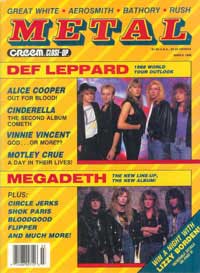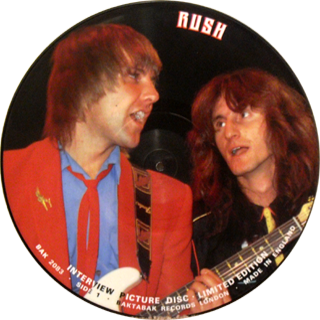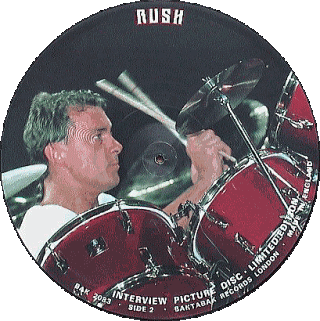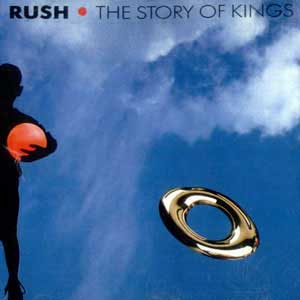Rush...What's The Hurry?
By Ray Bonici & Jo Bailey, Creem Close-Up, Metal, March 1988, transcribed by pwrwindows




Transcribers Note: this 1988 print article is the edited version of an audio interview with Alex Lifeson released by Baktabak records UK on 12" vinyl as "Rush Limited Edition Interview Picture Disc" (BAK2083) in 1987, reissued on CD as "The Story Of Kings" (CBAK4055) in 1992.
Few bands have endured-and aged so gracefully-as Rush. The Canadian trio have released 14 albums, nearly all them either gold or platinum, in their long career. Yet to many, Rush is a faceless band. Some critics have accused them of being non-entities and bland musicians.
In this candid interview, guitarist Alex Lifeson discusses this and much, much more-explaining the famous Rush work ethic, the burdens of success and the band's future goals.
And, as you'll see, Alex Lifeson is certainly not a man without an opinion.
Rush never seemed to be the archetypical rock 'n' roll band. Am I right?
Yeah, I think just the fact that we've been together from the start for 19 years, and touring together for 13 years, we must have done something different and right because there aren't that many bands that last that long. Because we're also close friends it was also very important to retain a family feel to the way we approach our organization, our music and our business. We're very good friends with our crew. There are some guys in our crew that have been there for 13 years. The management, we've been with them from the beginning.
Everyone is on a pension scheme.
Yeah, that's right. They don't wanna quit. So we've had this family-orientated outlook on working together. And we've also been fortunate that we've had commercial success doing things the way we want to do them. The management and record company are happy, so something is right in what we're doing.
Unlike many other rock 'n' roll bands, I don't ever recall hearing any gossip on Rush. Have Rush ever misbehaved?
We're not like a group of priests going on the road. We've had good times. We like to party and go crazy but that's never been important to this band. What's been important to us is the way we make and present our music. So we're coming from a different space. It's a different lifestyle for us. We work very, very hard on the road, we tour a lot and we look at it as a career, whereas for some other bands it's a lifestyle and an ideal to involve sex, drugs and rock 'n' roll-have a good time for five years and then it's over. For us, we've always been musicians before being a particular rock band.
The last time we spoke was some nine years ago and your attitude hasn't changed since that time.
Yeah, I think we've always been like that. We actually do enjoy and love what we do. We really do enjoy making records. In fact, this last record, Hold Your Fire, was the most fun we've ever had recording. We were so well organized and we ran everything so efficiently that we actually finished the recording early. It was a first for us. So it's still a labor of love for us, and we still enjoy touring so long as it's not too crazy...as it has been at times in the past. We prefer to work a little less than we used to and spend more time at home with our families.
Since you are quite successful in the States, that alone gives you career security. I suppose now you try and enjoy what you do as comfortably as possible.
Hmmmm, that's not quite right. I think it's easy to enjoy it and be as comfortable as possible, but it's dangerous at the same time. Because you then don't take chances and try something new for fear that it's not going to do well, and that you're not going to have this Mercedes or whatever next week. I think with our records we try things and sometimes it doesn't work, sometimes it works, Moving Pictures is one of our biggest records. It sold about three million or so. That's a lot of records to sell. Signals was a very difficult record, It didn't sell quite as well. On it we tried things that I listen to now and I know weren't right. So we learned from it. We learned that there were aspects about that record that we have to change. Then, with Grace Under Pressure, it was totally the opposite from Signals. It was another experiment in a different direction. So we're constantly trying new things and experimenting. If they sell well, great. If they don't so what: at least we were trying something different, trying to be different and to challenge ourselves musically. For me, Hold Your Fire is the best of all the last three or four albums. I hear elements of all those records in this one. It's satisfying because I can say that we have learned the best lessons from those experiments and we put them on this record. Maybe next year I won't think that-maybe next year I'll think these records aren't very good, which I hope I do because then you know you've got to choose something even better the next time. This has always been our attitude. Sure, our lifestyle has become more comfortable, but when it comes to our music we are very, very demanding on each other as well as ourselves.
You made Hold Your Fire in four or five different places. Are you getting used to that sort of lifestyle?
Yes, but it was hard in achieving that. When we signed, at the beginning, we had this big American deal and for six years we toured and ran into huge debts even though we sold a reasonable amount of records. So this whole lifestyle you mention came much later in our career and quite gradually. I would say that we started living comfortably in around '81 , when Moving Pictures became a success. In '75 and '76 we went through a very difficult period with no money, living in small apartments, barely paying rent and all that stuff. At the time you don't think it's a big deal, though.
How does the songwriting work in the band? Who is doing what?
Typically we go for about seven weeks. There is a studio that we use just outside of Toronto. We get up about 10 a.m., have breakfast together, discuss what's happening in the newspapers and what we're going to do workwise for the day. This studio is in a farm and Geddy and I put down our musical ideas on that. Neil continues writing all day at the house. He has an ashtray full of cigarettes and the floor is full of paper. We continue working like this till about 6 o'clock every day. Then we get together and we discuss the lyrics and the music. Sometimes Neil gives us lyrics to put music to, other times we give him a cassette of the music we were working on and he writes to that. But that hour to hour-and-a-half before dinner we all get together and work on the arrangement, make sure the lyrics fit correctly. Geddy's got to feel that he's singing the lyrics with conviction. Then in the evening, from nine to midnight, we play the stuff as a band. I think it's important that before you go to the studio to record, you play the songs like you would if you're playing it live-otherwise it would sound like it's pieces all put together. That's a typical day. That goes on for about six weeks or so. We work six days a week and have one day off.
Neil's lyrics tend to be a bit obscure at times.
They're not always easy to understand. He may have two or three meanings in his lyrics. I think it gets easier and better to understand with each record we make. His writing style changes. It is easier when he's sitting right next to you to say "What the hell does this mean?" He can then explain. Basically, we would know the intent from reading the lyrics. It's the same with the music; Neil will have suggestions or criticisms about a particular music part that Geddy and I have written. It's all part of arranging. Then again, arranging is taken one step further when we're all playing it together, and for the last week before we finish writing, Peter Collins, who's produced our last two records, comes over and again we go over to the next level of arranging and songwriting criticism. But we know now how Peter works and so we write with that in mind. Also, since we know what we want to accomplish with our music, it's really a matter of fine tuning at that stage.
Does it have to be that disciplined?
It's because we are disciplined and because of so many years of doing it and trying to do it a better way each time. It's very expensive to waste time in the studio. It is also a burden on your day-to-day living. Feeling stress and pressure in the studio slows you down and it hurts your performance. You need to be relaxed, and to be relaxed you have to do things very orderly, because that in itself gives you time. With this last record it is definitely the most orderly we've ever been.
How do you look on these up-and-coming bands: Poison, Motley Crue, Bon Jovi, W.A.S.P. For you they're up-and-coming because you've been so long in the business.
They're different type bands and I certainly wouldn't deny them their success or begrudge them their success. I mean Bon Jovi, he's been around for a while and it's not an overnight success with him. He is very smart, he knows exactly what he wants and what he's doing. A band like Kiss, l don't particularly like their music, but all through their career they've known exactly what they want and they've been very, very professional in achieving all those goals that they'd set for themselves. Bands like Cinderella, W.A.S.P. and Anthrax and most of those new HM bands, I don't give them much thought because I don't particularly like their form of music and I don't like the way it's become very formulated. I am not saying that they can't play or that they're bad bands, but for my style and taste and for what's important to me as a musician they don't really fall into my category of listening or of admiration.
As you say, Rush became successful gradually. Now someone like Bon Jovi became mega quite suddenly. I could see that change in his personality and attitude in the band at this year's Donington. I believe the guy is on the verge of having a breakdown and cracking up. I don't see these signs in Rush, anyway.
That is a good point. I think that it's possible to crack up and at times, just due to the pressure of touring, it comes close to that. I think with us, the fact that we have been together for 13 years with this line-up our popularity is still slowly climbing. We always sell a certain number of records. We know that there is this audience that like us and that regards us as their special group. They will continue buying our records because they're interested in what we're doing and what the life of the band is. So we have a very solid foundation. With somebody like Bon Jovi to go from having a good time to suddenly selling millions and millions of records and becoming enormous and having your face on every magazine, and constant requests of interviews, he can't go anywhere now without constantly being hounded by fans and other people. I'm sure he thought it was great at the beginning of this mania; he must have said "This is what it's all about. This is what I've been waiting for. Now I have freedom to do other things." But freedom is actually gone now, outta the window. Forget it! And this is because he has a very successfully commercial record. Our records, although they are commercial successes, are not commercially successful. They don't get much airplay. We don't get that kind of press these kind of groups get. People talk to us, we seem boring. We only talk about our music, we are not colorful personalities like maybe Jon Bon Jovi is or these guys in Cinderella or whatever. Those kind of groups perhaps like to make more of an impression on the press to make them more attractive in the fantasy world of what it's like to be a rock star. I am happy with the pace our life is going. I mean, every year we get asked to play Donington and every year we get offered more and more money. For us to play Donington now we could make a lot of money to come in play one day and go home. It's the same money like working two to three weeks on a tour. We always say no because it is summertime and we would rather be at home with our families. Our manager looks at us and he thinks we're crazy. So maybe we are a bit crazy after all.